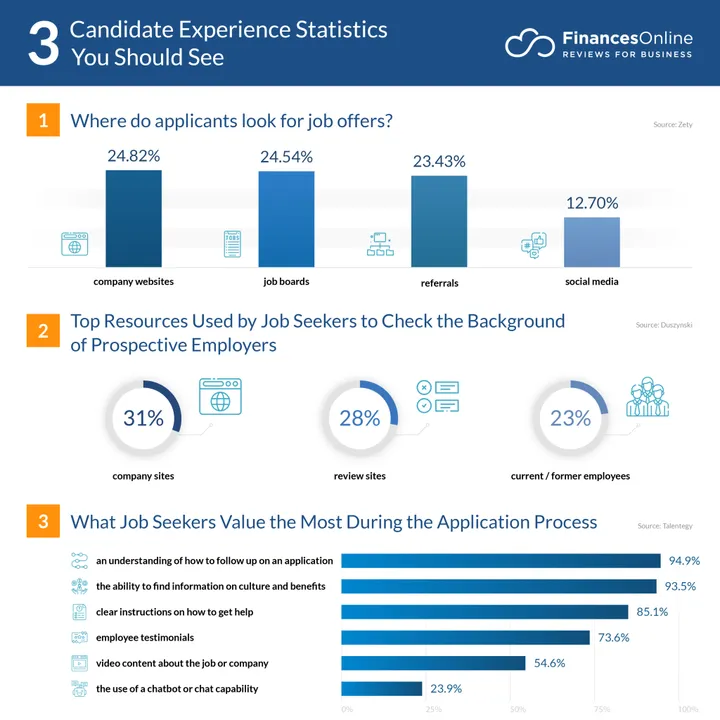A Better Candidate Experience Means Better Hiring Outcomes

With market conditions as they are today, every recruitment metric an institution can improve increases their odds of an accepted job offer. One of the earliest touch points in the process is candidate experience. When job seekers feel engaged and appreciated, it sets the stage for a fruitful interview process, excitement to move forward, and a positive response to a job offer.
From ignoring submissions, complex application requirements, lengthy interview and hiring timelines, to ghosting applicants altogether, there are many steps along the way to ruin candidate experience. The challenge for healthcare providers is to review their processes and assure smooth, responsive recruitment that makes applicants anxious to say yes to an offer.
How important is candidate experience?
In a study conducted by Finances Online, half of job seekers reported they declined an offer due to poor candidate experience. The way an institution presents itself to candidates clearly influences how they believe they will be treated as an employee. If the recruitment process isn’t representative of employee experience, half the talent you hope to hire will never say yes to an offer.
With all the resources devoted to recruitment, candidate experience is key to success. Routinely reviewing processes is necessary to assure applying is fast, easy, and seamless.

Infographic provided by www.financesonline.com
Where to review and revise
The best way to find out how easy (or difficult) it is to apply with your facility is to take your application process on a test run. Have an HR professional (or work with a novice) go through the steps necessary to apply, taking note of where there are difficulties and logjams and where there’s smooth sailing.
Are you mobile-friendly? Glassdoor found 58% of their users look for jobs on their phones. Being mobile-ready can increase the number of applicants by more than 10%. Mobile application processes should be easy and intuitive, however. They found less than half of those who start the process complete it, and it can take 80% longer to fully apply by phone versus on a computer. Make it easy to upload resumes or complete short, to-the-point applications to assure candidates complete the process.
Responsive time is the next important metric: one survey found 30% of job seekers ranked responsiveness as most important when it comes to candidate experience. If your system doesn’t have an automated response, add one. If you can, respond by text, for even more immediacy. Research shows 90% of text messages are read within the first 3 minutes of receipt. In fact, texts have a 98% open rate: emails have a 20% open rate.
Schedule interviews quickly. Automated scheduling systems are winning the talent war when it comes to candidate experience and securing potential hires before the competition. Screening software can easily find the best candidates for the position. If they make it through that tech, make sure it leads them directly to a page that schedules them immediately for available interviews. You’ll want your interview timeline to be tight; if you’re not ready to begin interviews within a week, don’t post your position yet. Wait until you’re able to interview quickly before you post any vacancy.
Communication is key. One survey found over 55% of candidates said they were rarely or never informed about the status of their application. A majority said they were dissatisfied or very dissatisfied with communication from employers. While you don’t have to call candidates daily, you should offer a timeline on when interviews will begin/end, when they can expect a call-back for a further round of interviews, and when a decision will be made in the hiring process. Clear communication with the applicant is necessary, so make sure to set reminders and contact with milestones and steps frequently throughout the process and always on the dates you said you would.
Focus on your time-to-hire. Glassdoor found time-to-hire varies by jobs and industry – anywhere from 10 days to over 50, depending on the position. The more complex the job, or the more challenging the talent market in your area, time-to-hire can be even more lengthy. In today’s market, institutions should focus on shorter recruitment metrics to avoid losing talent to the competition.
Look through your recent hires (or recent losses of talent) to measure your average timeline. Then look for ways you can shorten the process. Wait to post a job until all stakeholders involved are ready to interview. Start background screening earlier (if lengthy), in order to move the process along. Set finite dates to start/stop the interview process. Open-ended hiring – waiting until more people apply – is not supported by today’s market conditions. If you have even one viable candidate for a position, move the process forward to hire.
Better candidate experience can translate to better hiring outcomes. If you can improve processes, you may be able to boost candidate experience and increase your metrics. Healthcare providers have been painfully aware of talent shortages. For them, it’s worthwhile to leverage whatever advantage possible, whether it’s a competitive market or not.
Related Posts
